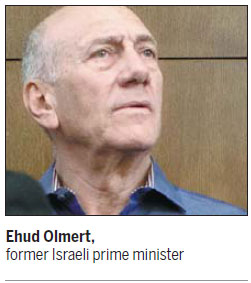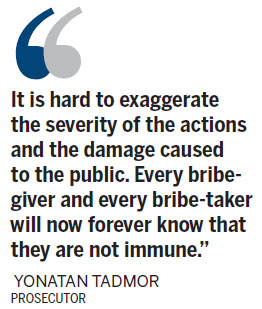Israeli court convicts former leader Olmert of bribery
By Associated Press in Jerusalem (China Daily) Updated: 2014-04-01 07:21An Israeli court on Monday convicted former prime minister Ehud Olmert in a wide-ranging bribery case, a verdict that could send him to prison and is likely to rule out any immediate hopes for a political comeback.
The development seals the most serious legal battle the 68-year-old Olmert has been waging since he was forced to step down as prime minister in 2009 amid a flurry of corruption allegations.
The Tel Aviv district court handed down its decision in a Jerusalem real estate scandal case related to Olmert's activities before he become prime minister in 2006. A total of 13 government officials, developers and other businesspeople were charged in three separate schemes related to the Holyland housing development in Jerusalem.
"It is not an easy day for Olmert," said his lawyer, Roy Blecher.
Sentencing is set for April 28. Legal experts say that a conviction will almost certainly entail time in prison for Olmert.
According to the original 2012 indictment, millions of dollars illegally changed hands to promote a series of real estate projects, including a controversial housing development in Jerusalem that required a radical change in zoning laws and earned the developers tax breaks and other benefits.

At the time, Olmert was mayor of Jerusalem and minister of industry and trade. He was accused of taking bribes to push the project forward.
The conviction brings an end to Olmert's long political career that was dogged by corruption allegations.
He has already faced trial on separate charges of accepting illicit funds from an US supporter and double-billing Jewish groups for trips abroad.
In 2012, Olmert was acquitted of major charges in separate cases involving his links to a US businessman while he was Jerusalem mayor and an Israeli Cabinet minister, although he was convicted of the lesser charge of breach of trust.
That was dwarfed by Monday's conviction.
At the center of the case was the Holyland housing development, a hulking hilltop project that Jerusalem residents long suspected was tainted by corruption.
The case broke in 2010 on the strength of a Israeli businessman, Shmuel Dechner, who was involved in the project and turned state's witness. Dechner died last year from an illness.
The indictment laid out one of the largest corruption scandals ever exposed in Israel. It accused Olmert of seeking money, through a middleman, from Holyland developers to help his brother, Yossi, who fled Israel because of financial problems. According to the indictment, Yossi Olmert received about $100,000.
Ehud Olmert was also accused of asking the middleman to help city engineer Uri Sheetrit, who also had money woes. Sheetrit later dropped his opposition to the broad expansion of the Holyland complex, which burgeoned from a small development into a massive, high-rise project that sticks out from its low-rise neighbors. According to the indictment, Sheetrit received hundreds of thousands of dollars in bribes.
Inside the cramped courtroom on Monday, Judge Uri Rozen ruled out Olmert's assertion that he was unaware of the money transfers. Reading from a 700-page verdict, he said Dechner's testimony was trustworthy and that Olmert had lied to the court.

The trial also ensnares other powerful Israeli figures.
Former Jerusalem Mayor Uri Lupolianski, who succeeded Olmert, was charged in the Jerusalem real estate scandal. Danny Dankner, the former chairman of Israel's second-biggest bank, was charged with offering hundreds of thousands of dollars in bribes to a government official to rezone land for one of his businesses.
Both Lupolianski and Dankner, along with several other figures, were convicted on Monday as well, and only three lesser figures in the case were acquitted.
"It is hard to exaggerate the severity of the actions and the damage caused to the public," said prosecutor Yonatan Tadmor. "Every bribe-giver and every bribe-taker will now forever know that they are not immune."
Last week, the case took a dramatic turn when a longtime aide of Olmert's agreed to turn state's witness against him. Shula Zaken reached a deal with authorities to testify against Olmert. Zaken, who has been Olmert's most loyal confidante for more than 30 years, agreed to serve 11 months in prison as part of her plea bargain. Zaken was also convicted on Monday.
On Monday, Olmert walked into the courtroom wearing a navy blue shirt and shook hands with the other defendants, exchanging hugs and kisses, while pointedly ignoring Zaken, who kept her back to him.
Olmert was prime minister from 2006 to 2009. His tenure was marked by wars against Lebanon's militant Hezbollah group and Hamas militants in Gaza, in addition to intense peace negotiations with the Palestinians.
AP - Reuters










